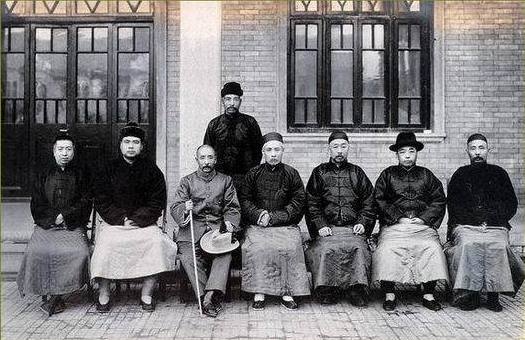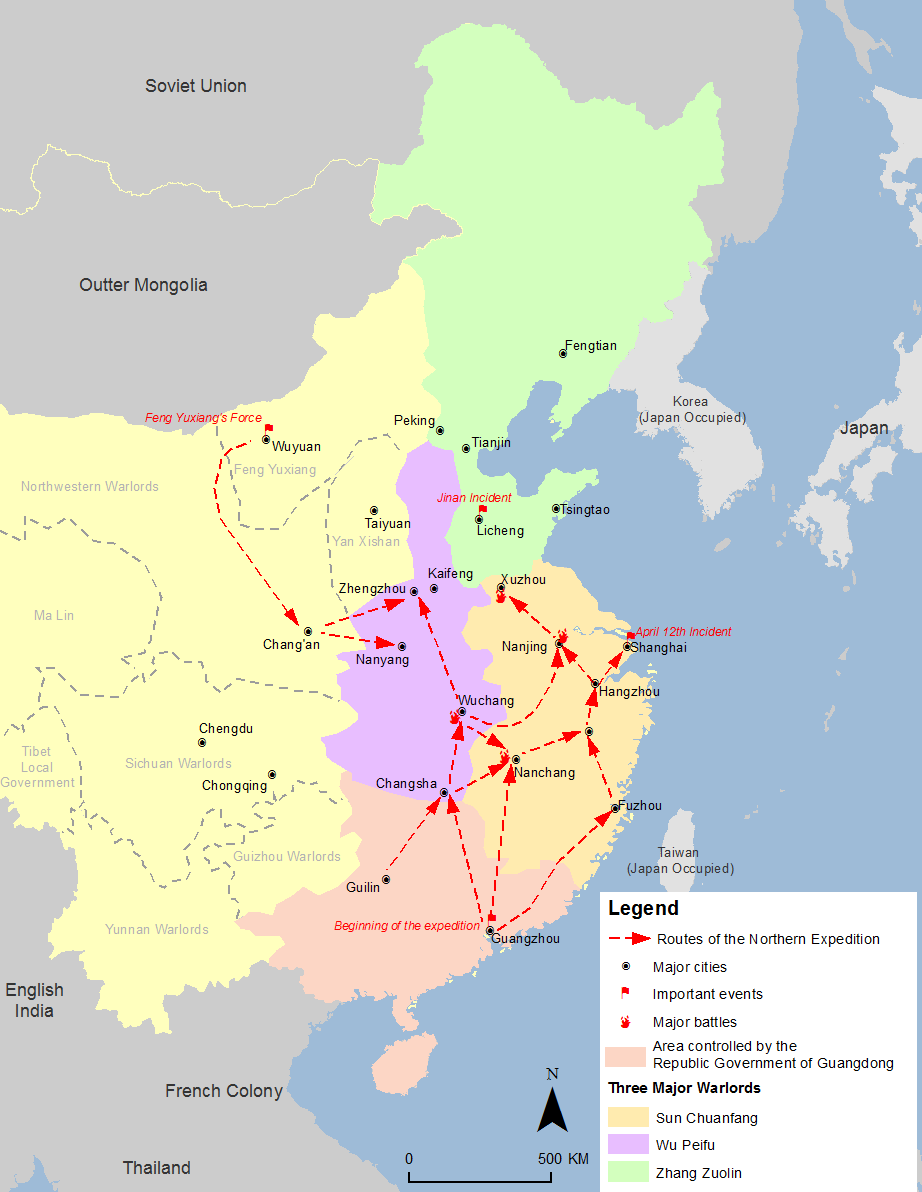|
Shangguan Yunxiang
Shangguan Yunxiang (; 1895–8 August 1969) was a Kuomintang general from Shanghe County, Shandong. He was the brother-in-law of Kuomintang general Yu Hanmou. Early life Shangguan enrolled in the Infantry Division of Baoding Military Academy in 1917, and was the same class as Ye Ting and Gu Zhutong. After graduating in 1919, Shangguan served under the direct line of Sun Chuanfang, platoon leader for the guard, and was promoted all the way in Sun Army zhong. After the Beijing Coup in 1924, the Fengtian clique went south to occupy Jiangsu, and was soon expelled from the army by Sun. In 1925, with the support of Zhang Zongchang, Shi Congbin went south to attack Sun Chuanfang. Shangguan led a group of detours to the enemy, cut off Shi's retreat, and captured Shi Congbin in one fell swoop. Service with Kuomintang In 1927, in order to resist the Northern Expedition of the National Revolutionary Army, Sun Chuanfang shook hands with Zhang Zongchang. Zhang led the army south to support S ... [...More Info...] [...Related Items...] OR: [Wikipedia] [Google] [Baidu] |
Shanghe County
Shanghe County () is under the administration of Jinan, the capital of Shandong province, People's Republic of China. The population was in 1999. Administrative divisions As 2012, this county is divided to 2 subdistricts, 5 towns and 5 townships. ;Subdistricts *Xushang Subdistrict () *Yuhuangmiao Subdistrict () ;Towns ;Townships Climate References External links Official home page Shanghe Jinan {{Shandong-geo-stub ... [...More Info...] [...Related Items...] OR: [Wikipedia] [Google] [Baidu] |
Battle Of Shanghai
The Battle of Shanghai () was the first of the twenty-two major engagements fought between the National Revolutionary Army (NRA) of the Republic of China (ROC) and the Imperial Japanese Army (IJA) of the Empire of Japan at the beginning of the Second Sino-Japanese War. It lasted from August 13, 1937, to November 26, 1937, and was one of the largest and bloodiest battles of the entire war, later described as "Stalingrad on the Yangtze", and is often regarded as the battle where World War II started. After over three months of extensive fighting on land, in the air and at sea, the battle concluded with a victory for Japan. Since the Japanese invasion of Manchuria in 1931 followed by the Japanese attack of Shanghai in 1932, there had been ongoing armed conflicts between China and Japan without an official declaration of war. These conflicts finally escalated in July 1937, when the Marco Polo Bridge Incident triggered the full advance from Japan. Dogged Chinese resistance at Sha ... [...More Info...] [...Related Items...] OR: [Wikipedia] [Google] [Baidu] |
Jiangsu
Jiangsu (; ; pinyin: Jiāngsū, Postal romanization, alternatively romanized as Kiangsu or Chiangsu) is an Eastern China, eastern coastal Provinces of the People's Republic of China, province of the China, People's Republic of China. It is one of the leading provinces in finance, education, technology, and tourism, with its capital in Nanjing. Jiangsu is the List of Chinese administrative divisions by area, third smallest, but the List of Chinese administrative divisions by population, fifth most populous and the List of Chinese administrative divisions by population density, most densely populated of the 23 provinces of the People's Republic of China. Jiangsu has the highest GDP per capita of Chinese provinces and second-highest GDP of Chinese provinces, after Guangdong. Jiangsu borders Shandong in the north, Anhui to the west, and Zhejiang and Shanghai to the south. Jiangsu has a coastline of over along the Yellow Sea, and the Yangtze River passes through the southern part ... [...More Info...] [...Related Items...] OR: [Wikipedia] [Google] [Baidu] |
Fengtian Clique
The Fengtian clique () was one of several opposing military factions that constituted the early Republic of China during its Warlord Era. It was named after Fengtian Province (now Liaoning), and operated from a territorial base comprising the three northeastern provinces that made up Manchuria.Fengtien Clique '''', 3rd Edition (1970-1979). Warlord , known as the "Old Marshal," led the clique with support from . Foll ... [...More Info...] [...Related Items...] OR: [Wikipedia] [Google] [Baidu] |
Beijing Coup
The Beijing Coup () refers to the October 1924 ''coup d'état'' by Feng Yuxiang against Chinese President Cao Kun, leader of the Zhili warlord faction. Feng called it the Capital Revolution (). The coup occurred at a crucial moment in the Second Zhili–Fengtian War and allowed the pro-Japanese Fengtian clique to defeat the previously dominant Zhili clique. Followed by a brief period of liberalization under Huang Fu, on November 23 this government was replaced by a conservative, pro-Japanese government led by Duan Qirui. The coup alienated many liberal Chinese from the Beijing government. Events In 1923 Cao Kun became president by bribing the National Assembly. His Zhili clique, whose military was commanded by Wu Peifu, had already established itself as the dominant military force in China through a succession of resounding military victories. However, Cao was not satisfied with being just a strongman and wished the prestige of being officially titled head of state. After ousting ... [...More Info...] [...Related Items...] OR: [Wikipedia] [Google] [Baidu] |
Sun Chuanfang
Sun Chuanfang () (April 17, 1885 – November 13, 1935) a.k.a. the "Nanking Warlord" or leader of the "League of Five Provinces" was a Zhili clique warlord and protégé of the "Jade Marshal" Wu Peifu (1874–1939). Biography Sun Chuanfang was born in Licheng, Shandong Province. Wang Yingkai, a rising officer in the Beiyang Army and protégé of Yuan Shikai, the commander of the Beiyang Army, married Sun's sister, and Sun took advantage of his brother-in-law's position and joined a training camp in 1902. Wang later recommended Sun to Tianjin Military Academy because of the latter's outstanding capabilities; in 1904 he also sent Sun abroad to Japan for more education at the Tokyo Shimbu Gakko, a military preparatory school. Sun eventually graduated from the sixth class of the Imperial Japanese Army Academy and returned to China in 1908. Upon his return from Japan, Wang and his political ally, Tie Liang, happened to be the ones presiding over the examination aimed at testing f ... [...More Info...] [...Related Items...] OR: [Wikipedia] [Google] [Baidu] |
Gu Zhutong
GU, Gu, or gu may refer to: Arts and entertainment Music * Gu (instrument), Chinese drums ** Bangu (drum) () or Gu (), a Chinese "flowerpot" drum * ''Global Underground'', an electronic dance music compilation series Other media * GU Comics, an online comic * '' .hack//G.U.'', a video game series * '' Godzilla: Unleashed'', a video game Universities * Gandhara University, Peshawar, Khyber Pakhtunkhwa, Pakistan * Gannon University, Erie, Pennsylvania, United States * Gauhati University, Guwahati, Assam, India * , or , Amsterdam, Netherlands * Georgetown University, Washington D.C., United States * Ghazi University, Dera Ghazi Khan, Punjab, Pakistan * GIFT University, Gujranwala, Punjab, Pakistan * Gomal University, Dera Ismail Khan, Khyber Pakhtunkhwa, Pakistan * Gonzaga University, Spokane, Washington, United States * University of Gothenburg, Gothenburg, Sweden ( sv, Göteborgs universitet , links=no) * Grantham University, Kansas City, Missouri, United States * Griffith Univer ... [...More Info...] [...Related Items...] OR: [Wikipedia] [Google] [Baidu] |
Ye Ting
Ye Ting () (September 10, 1896 – April 8, 1946), born in Huiyang, Guangdong, was a Chinese military leader who played a key role in the Northern Expedition to reunify China after the 1911 Revolution. After serving with the Kuomintang, Ye later joined the Communist Party of China (CPC). Early life Ye was born on April 10, 1896 (August 4 of Guangxu 22nd year in Qing Dynasty) at Zhoutian village, Danshui town, in Guishan county, located in the Guangdong province. Ye's ancestors migrated from Ye county in Henan to the south, through Meizhou and Hingning, eventually settling in Guangdong. Ye's grandfather was Ye Hanchu, who had experience in medicine. Ye's father was Ye Xisan, who travelled to Malaysia in his early life to work on a plantation, learning how to plant tropical fruits. After returning to his hometown, Ye's father rented 11 mus' of farmland and planted fruit trees to make a living. Ye's mother's last name is Wu and he is the eighth child in the family. Ye was en ... [...More Info...] [...Related Items...] OR: [Wikipedia] [Google] [Baidu] |
Baoding Military Academy
Baoding Military Academy or Paoting Military Academy () was a military academy based in Baoding, during the late Qing dynasty and early Republic of China, in the first two decades of the 20th century. For a time, it was the most important military academy in China, and its cadets played prominent roles in the political and military history of the Republic of China. The Baoding Military Academy closed in 1923, but served as a model for the Whampoa Military Academy, which was founded in Guangzhou in 1924. It, along with the Yunnan Military Academy and the Whampoa Military Academy, was one of the “three major strategist cradles in modern China”. During the Second Sino-Japanese War, half of 300 divisions in China's armed forces were commanded by Whampoa graduates and one-third were Baoding cadets. Predecessors In 1885 Li Hongzhang founded the Tianjin Military Academy 天津武備學堂 for Chinese army officers, with German advisers, as part of his military reforms. The move was su ... [...More Info...] [...Related Items...] OR: [Wikipedia] [Google] [Baidu] |
Yu Hanmou
Gen. Yu Hanmou (; 1896–1981) was a KMT general from Guangdong. He was the Commander-in-Chief of the 12th Army Group from 1938–44. He commanded the defense of Guangdong in the Canton Operation The Canton Operation (; pinyin: Guǎngzhōu Zhànyì) was part of a campaign by Empire of Japan, Japan during the Second Sino-Japanese War to blockade Republic of China (1912-1949), China to prevent it from communicating with the outside world ... and 1939-40 Winter Offensive. Later in 1944 until the end of the war, he commanded the 7th War Area, fighting in the Battle of Henan-Hunan-Guangxi. References SourcesYu Hanmou 1896 births 1981 deaths National Revolutionary Army generals from Guangdong Politicians from Zhaoqing Republic of China politicians from Guangdong Politicians of Taiwan Taiwanese people from Guangdong {{China-mil-bio-stub ... [...More Info...] [...Related Items...] OR: [Wikipedia] [Google] [Baidu] |
General
A general officer is an Officer (armed forces), officer of highest military ranks, high rank in the army, armies, and in some nations' air forces, space forces, and marines or naval infantry. In some usages the term "general officer" refers to a rank above colonel."general, adj. and n.". OED Online. March 2021. Oxford University Press. https://www.oed.com/view/Entry/77489?rskey=dCKrg4&result=1 (accessed May 11, 2021) The term ''general'' is used in two ways: as the generic title for all grades of general officer and as a specific rank. It originates in the Tudor period, 16th century, as a shortening of ''captain general'', which rank was taken from Middle French ''capitaine général''. The adjective ''general'' had been affixed to officer designations since the late Middle Ages, late medieval period to indicate relative superiority or an extended jurisdiction. Today, the title of ''general'' is known in some countries as a four-star rank. However, different countries use di ... [...More Info...] [...Related Items...] OR: [Wikipedia] [Google] [Baidu] |
Kuomintang
The Kuomintang (KMT), also referred to as the Guomindang (GMD), the Nationalist Party of China (NPC) or the Chinese Nationalist Party (CNP), is a major political party in the Republic of China, initially on the Chinese mainland and in Taiwan after 1949. It was the sole party in China during the Republican Era from 1928 to 1949, when most of the Chinese mainland was under its control. The party retreated from the mainland to Taiwan on 7 December 1949, following its defeat in the Chinese Civil War. Chiang Kai-shek declared martial law and retained its authoritarian rule over Taiwan under the ''Dang Guo'' system until democratic reforms were enacted in the 1980s and full democratization in the 1990s. In Taiwanese politics, the KMT is the dominant party in the Pan-Blue Coalition and primarily competes with the rival Democratic Progressive Party (DPP). It is currently the largest opposition party in the Legislative Yuan. The current chairman is Eric Chu. The party originate ... [...More Info...] [...Related Items...] OR: [Wikipedia] [Google] [Baidu] |


